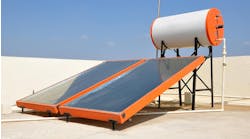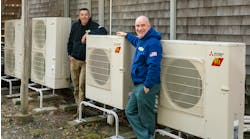Latest from Solar
IAPMO Seeks USHGC Task Group Members
Heat Pumps Get Us to Net Zero
Sponsored
Bosch gives European technology an American accent
FT. LAUDERDALE, FLA. — When you hear the brand name Bosch, you might think of power tools or, perhaps, high-end kitchen appliances. While that’s true, Robert Bosch Co. has made strategic purchases of Buderus boilers and Florida Heat Pump that put it in the middle of the heating and cooling market.
The key for contractors is that Bosch is a producer of high-end hydronic and HVAC products and components for both the residential and commercial forced air and hot water markets. From geothermal heat pump systems to large commercial/industrial boiler systems, to tankless water heaters and solar thermal water heating technology, this international company, which began life in 1897 in Germany as a producer of magneto ignition devices, offers contractors a wide choice of products and services to help them differentiate themselves in the marketplace.
The division to keep in mind is Bosch Thermotechnology Corp., which includes Buderus boilers, Florida Heat Pump commercial geothermal heat pumps, and Bosch-Climate residential geothermal heat pumps.
In an exclusive interview with Ervin Cash, president and CEO for Bosch Thermotechnology North America, the editors of both CONTRACTOR and sister publication Contracting Business learned much about the company and its focus on plumbing, hydronic and HVAC contractors.
Cash’s responsibilities include all the products that Bosch brings to market in the U.S. as part of its thermotechnology business. His education includes three degrees: one in communications and human relations, one in mechanical engineering, and an MBA with a focus on marketing and finance.
“For me it’s always been important to understand people,” Cash said, “and how people use things, how they want to buy things, and technically, how products need to be delivered to achieve performance standards.”
He says the key people in the Bosch strategy are contractors.
“The contractor is the person we focus on as the most strategic channel partner because it’s through them that our products get sold, whether properly installed or not,” Cash said. “So we put forth an intensive effort to train the contractor first. And it’s not just product training, but application training as well. We listen to how contractors conduct their business and look for ways to make it easier for them in terms of how they get leads, what would make it easier for them in terms of accessories so we can cut down on wasted travel and provide them with one-stop shops.”
Bosch looks for combinations of technology that contractors can offer to differentiate themselves and stand out among their competitors, Cash said.
“If we position contractors in a strong business position, he becomes our best asset,” he said. “Once we have a great relationship with contractors and they are staying in business with us, that is a benefit to the end user. So from my perspective, the contractor is the most critical asset in the chain.”
Certification plays an important role in this strategy. Cash says that Bosch is a strong supporter of industry standards, from a product as well as a training standpoint.
“We work with NATE to make sure that there are proper procedures with regard to the installation and service of geothermal technology and are also working with them on other certifications,” Cash said.
For Bosch, what are hot are the higher efficiency levels, lower noise levels, and more compactness levels of its equipment plus the serviceability of its products. In Europe a lot of manufacturers are producing combination equipment that combines heating, air conditioning and domestic hot water all in the same box. While that has yet to catch on in the U.S., Bosch has the diversity of products necessary to put such packages together.
Conversely, geothermal technology is leading the way in the U.S. today but not so in Europe. The reasons for this, Cash explained, is that the European marketplace, specifically in the northern reaches of the continent, are primarily concerned with heating and much of that is boiler-based heat as opposed to geothermal and ground source. This boiler technology installed base is so old and the costs to change them out are so high that it’s beginning to open the door to geothermal.
“We sell boiler-based technologies in Europe, as well as in Canada and in the Northern parts of the U.S., so we’ve been able to bring that technology successfully to the U.S.,” he said.
The firm’s high-efficiency products has allowed it to get involved in projects that it might call the EcoPlus Homes or NetZero homes. The company can use its product portfolio to create homes that don’t use energy; they generate it and give it back to the grid.
“For us, green becomes part of the future of the way out of this trouble,” he said. “First, it translates into lower operating costs. At the end of the day the consumer can pay less and still have comfort. That is key. Second, we manufacture all our geothermal technology in the U.S. We’re committed to help create more jobs, technical jobs, on U.S. soil. We take this very seriously.”
With regard to geothermal and solar, Cash said that he feels that the operational and first cost efficiencies of these systems are having a greater impact today than ever before. Plus, with all the Federal, State, and utility tax credits and incentives, these green systems are more affordable than ever before.
He says that the tax credits make a statement because it shows where the federal government wants to spend its money.
“All the space conditioning technologies had substantial tax credits through the end of 2010,” he noted. “Now most of those have been reduced to flat dollar amounts. The exception are with geothermal and solar, which standout because they continue to have the 30% credit through the year 2016. So you stand back and say, ‘What is so significant about those technologies?’ Here’s what I think: when you look at the overall impact on the environment, geothermal is about as clean as you can get. The government knows this. It means we have geothermal energy to heat and cool homes and that removes pressure from the grid. It means that we can reduce the import of fossil fuels, and it enables us to take advantage of a very sustainable fuel source.”
Because geothermal is not mainstream right now and the government knows that, the tax credits are a way to help broaden its appeal. The credits help manufacturers create momentum behind manufacturing excellence and training of contractors. Contractors can make it widely available to consumers, and consumers can get it installed.
“This is a long-term project and the incentives are geared at giving it a solid kick-start,” Cash said. “So the tax incentives are an important part of the government’s energy strategy as it targets a small industry with a lot of momentum and upside. There are still a lot of people who need to be educated and contractors who still need training.”
Related Articles:
Bosch eyes Buderus purchase
Related Articles:
Bosch buys heat pump maker FHP
Robert P. Mader
Bob Mader is the Editorial Director for Penton's mechanical systems brands, including CONTRACTOR magazine, Contracting Business and HPAC Engineering, all of which are part of Penton’s Energy and Buildings Group. He has been with CONTRACTOR since 1984 and with Penton since 2001. His passions are helping contractors improve their businesses, saving energy and the issue of safeguarding our drinking water. He is a graduate of the University of Notre Dame with an A.B. in American Studies with a Communications Concentration.


